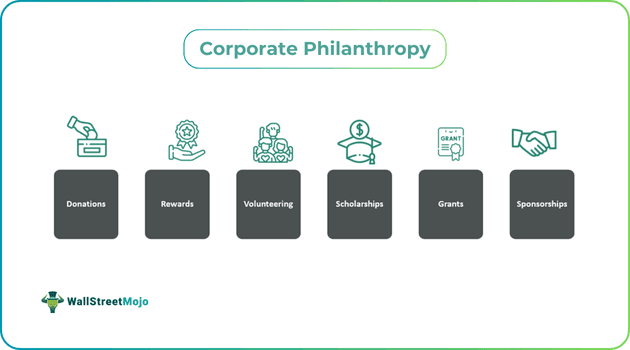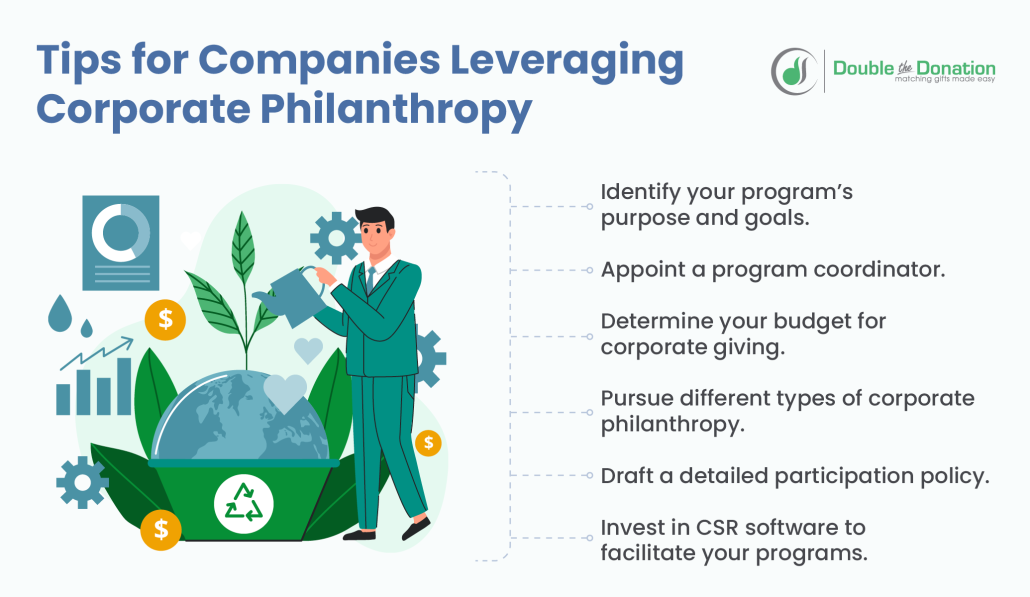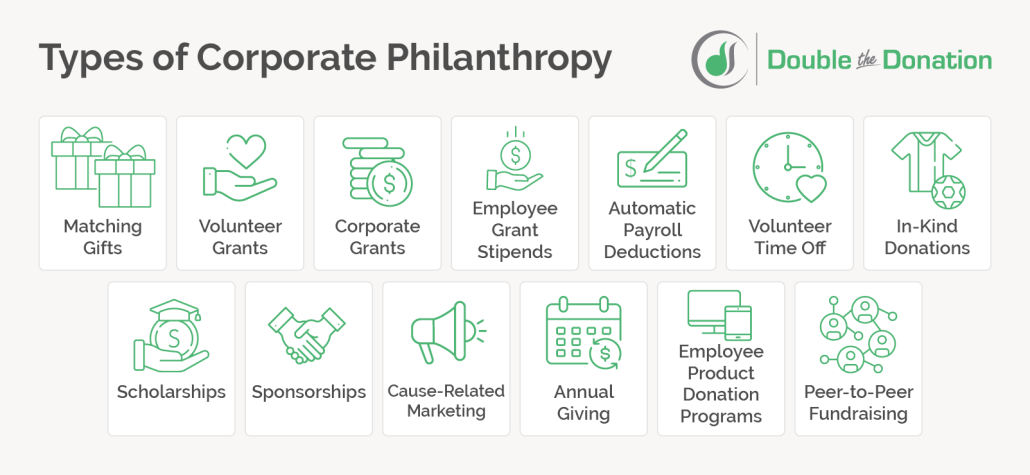Why modern companies use corporate philanthropy to boost brand loyalty and customer trust
The Function of Company Philanthropy in Fostering Sustainable Business Practices
Corporate philanthropy has actually arised as a crucial strategy for companies intending to integrate sustainability right into their procedures. By straightening corporate purposes with ecological and social campaigns, companies can cultivate much healthier communities. This approach not only boosts company reputation but additionally reinforces stakeholder partnerships. However, real level of its effect on long-lasting company success stays to be explored. What innovative practices are being adopted consequently?
Understanding Company Philanthropy and Its Relevance
Corporate philanthropy acts as an important system with which organizations can add to social wellness while boosting their very own reputations. This practice entails companies allocating resources, such as funds, time, or proficiency, to sustain community campaigns, philanthropic reasons, or social programs. By engaging in philanthropic efforts, business can address pressing social concerns, such as education, health care, and ecological worries, thus playing a crucial role in fostering positive adjustment.
Company philanthropy can boost employee spirits and bring in ability, as people significantly look for to function for socially accountable companies. It can additionally strengthen client loyalty, as customers like brand names that show a commitment to making a distinction. Ultimately, recognizing the value of corporate philanthropy hinges on identifying its dual benefits: improving community welfare while concurrently enhancing organization trustworthiness and dependability in the eyes of stakeholders. This positioning of social duty with industrial passions underscores its value in today's business landscape.
The Link Between Company Philanthropy and Sustainability
While numerous firms involve in philanthropy to improve their public picture, a much deeper link exists in between business philanthropy and sustainability. Company philanthropy typically straightens with lasting techniques by sustaining campaigns that deal with ecological and social obstacles. When businesses invest in neighborhood tasks, eco-friendly power, or curricula, they add to a healthier community and society. This dedication not just promotes a good reputation yet likewise enhances stakeholder connections, boosting brand name loyalty.

Situation Studies: Effective Corporate Philanthropy Initiatives
Numerous firms have effectively integrated philanthropic campaigns into their business methods, demonstrating the tangible benefits of such dedications. For example, Microsoft has released numerous programs, such as its AI for Earth initiative, which sustains environmental sustainability with technology. This approach not just help conservation initiatives but additionally enhances Microsoft's online reputation as a leader in business duty.
Likewise, Unilever's Lasting Living Strategy highlights social and ecological effect, aligning its philanthropy with company purposes. By funding projects that boost health and sanitation, Unilever strengthens its brand name while contributing to global health.
An additional noteworthy instance is Patagonia, which vows 1% of sales to ecological causes. This dedication reverberates with customers, cultivating loyalty and driving sales.
These study highlight that efficient company philanthropy can produce navigate to this website economic returns while promoting sustainable practices, strengthening the idea that honest organization techniques are useful for both society and profits.
Building Stronger Stakeholder Relationships With Philanthropy
Philanthropy acts as a crucial device for business looking for to reinforce their partnerships with stakeholders, as it cultivates trust fund and shows a commitment to social obligation. By engaging in charitable initiatives, companies can link with regional areas, improving their credibility and encouraging stakeholder loyalty. This engagement typically brings about significant communications, developing a feeling of common worths between the company and its stakeholders.
Philanthropic efforts can resolve particular neighborhood needs, permitting companies to contribute favorably to societal challenges. This involvement not only showcases a company's moral stance but additionally assists in drawing in and retaining consumers who focus on social obligation.
Additionally, staff members commonly feel extra motivated and involved when they see their organization proactively joining philanthropic tasks, causing an extra productive workplace culture. Subsequently, company philanthropy comes to be a critical avenue for constructing stronger, more resilient partnerships with varied stakeholder groups.
Determining the Impact of Company Philanthropy on Organization Success
The connection in between company philanthropy and stakeholder engagement sets the stage for assessing its effect on overall business success. Organizations usually determine this effect via various metrics, including brand name credibility, employee complete satisfaction, and client loyalty. Philanthropic efforts can improve a firm's image, fostering count on amongst financiers and customers alike. Additionally, engaged employees often tend to show higher spirits and efficiency, directly correlating to enhanced business performance.
Quantitative evaluation can also be used, with organizations evaluating economic returns versus philanthropic expenditures. Study suggests that firms with solid humanitarian dedications typically experience greater supply performance and minimized volatility. Furthermore, qualitative evaluations, such as stakeholder responses, can give insights into neighborhood perceptions and long-lasting relational benefits.
Eventually, gauging the influence of corporate philanthropy needs a complex method, integrating both quantitative and qualitative data to assure a thorough understanding of its influence on service success. corporate philanthropy.
Often Asked Concerns
How Can Small Services Take Part In Company Philanthropy Efficiently?

What Are Common Misunderstandings About Business Philanthropy?

Just How Does Corporate Philanthropy Impact Worker Spirits?
Corporate philanthropy positively influences worker morale by promoting a feeling of function, enhancing job complete satisfaction, and promoting commitment. Workers commonly really feel more engaged and encouraged when their business adds to social causes, developing a supportive workplace.
What Are the Tax Obligation Advantages of Corporate Philanthropy for Organizations?
Business philanthropy uses significant tax obligation advantages for organizations, consisting of reductions on philanthropic payments and potential decreases in taxable revenue. These motivations motivate firms to take part in social efforts while all at once improving their monetary standing.
Just How Can Firms Pick Effective Philanthropic Partners?
Firms can these details select efficient humanitarian companions by assessing positioning with their values, assessing impact possibility, taking a look at economic openness, and fostering solid communication. This calculated method enhances cooperation and guarantees shared benefits for both parties involved.
Business philanthropy serves as an important mechanism with which services can add to social wellness while boosting their very own online reputations - corporate try these out philanthropy. Eventually, comprehending the importance of corporate philanthropy lies in identifying its double advantages: enhancing neighborhood well-being while at the same time enhancing organization integrity and reliability in the eyes of stakeholders. While lots of business engage in philanthropy to enhance their public image, a deeper connection exists between business philanthropy and sustainability. The connection between company philanthropy and stakeholder interaction sets the stage for reviewing its influence on total service success. Company philanthropy supplies substantial tax advantages for services, consisting of reductions on charitable contributions and potential reductions in taxed income